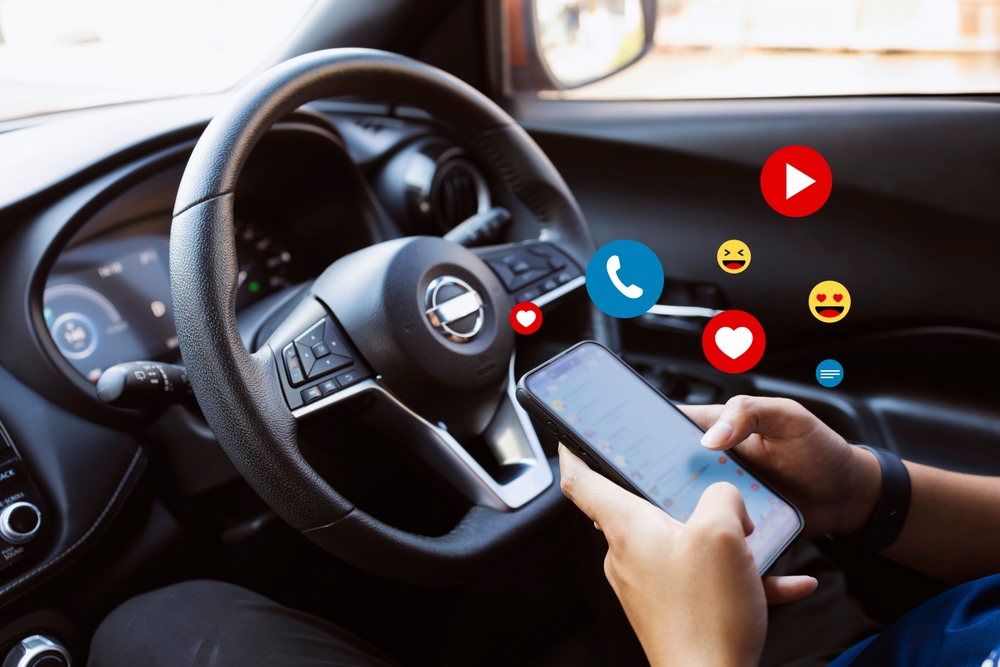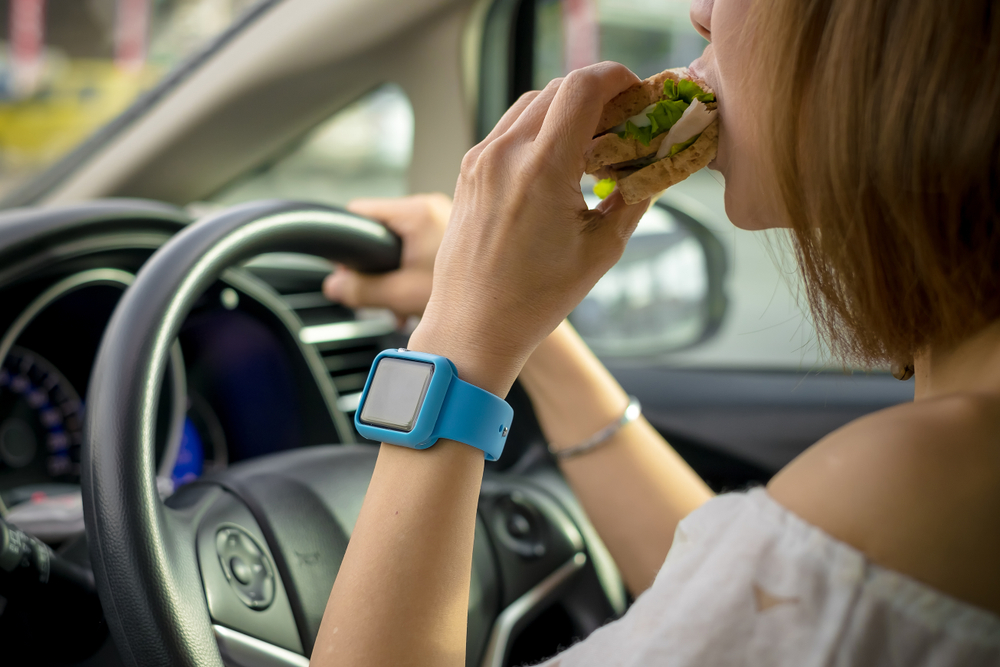Distracted driving is often associated with texting behind the wheel, but the reality is that it encompasses far more than just phone use. From grooming to reaching for food, a wide range of everyday behaviors can cause a driver to lose focus—leading to serious, even fatal, accidents.

In Southwest Florida, distracted driving accidents continue to rise, with more drivers engaging in risky habits that impair their attention on the road. If you’ve been injured in an accident caused by a distracted driver, understanding these behaviors can help you determine liability and take legal action.
Below, the personal injury attorneys at Aloia | Roland explain what qualifies as distracted driving and highlight seven surprising causes that may be more common than you think.
What Is Distracted Driving?
Distracted driving refers to any activity that diverts a person’s attention away from the primary task of driving. This can include:
- Visual distractions: Taking your eyes off the road
- Manual distractions: Taking your hands off the wheel
- Cognitive distractions: Taking your mind off driving
According to the National Highway Traffic Safety Administration (NHTSA), distracted driving claimed over 3,200 lives in a recent year, and thousands more were injured—many in preventable crashes.
Florida law prohibits texting while driving, but other forms of distraction remain legal, even though they’re just as dangerous.
7 Surprising Causes of Distracted Driving Accidents
While cell phone use remains one of the leading causes of distracted driving accidents, here are seven lesser-known—but equally hazardous—habits that can impair a driver’s focus:
1. Eating and Drinking Behind the Wheel
Grabbing a quick bite from a drive-thru may seem harmless, but eating or drinking while driving often requires both hands and divides a driver’s attention. Spills or hot beverages can create sudden, dangerous distractions.

Did you know? The NHTSA found that drivers who eat or drink while driving are 3.6 times more likely to be involved in a crash.
2. Grooming or Applying Makeup
Using the rearview mirror for a last-minute touch-up is far more distracting than drivers may realize. Whether it’s brushing hair or applying mascara, grooming requires visual, manual, and cognitive focus—all of which should be dedicated to the road.
In personal injury cases, this type of behavior can be used to establish negligence on the part of the driver.
Adjusting GPS or Music Controls
Interacting with a GPS, radio, or music app—especially when done manually—can take a driver’s eyes off the road for several seconds. Even voice-activated systems can cause cognitive distraction if they require too much mental effort.
In Fort Myers and throughout Southwest Florida, distracted driving linked to GPS usage is a growing concern, especially with tourists unfamiliar with local roads.
4. Talking to Passengers
Engaging conversations can be as distracting as texting, especially for inexperienced or younger drivers. Emotional discussions or turning to face a passenger can create both cognitive and visual distractions.
Florida law may not regulate this behavior, but it can still be presented in court as a contributing factor in an accident.
5. Reaching for Objects
Reaching into the back seat for a bag, phone, or child’s toy requires a driver to remove both hands from the wheel—and their focus from the road. This kind of physical distraction significantly reduces reaction time.
In cases where a crash occurs during such behavior, witness statements, dash cam footage, or black box data can help prove distraction was involved.
6. Daydreaming or “Highway Hypnosis”
Not all distractions are physical. Mental distractions—like zoning out, thinking about work, or getting lost in thought—can impair a driver just as severely. This is often referred to as “highway hypnosis.”
While it may be harder to prove than physical distractions, experienced personal injury attorneys know how to build a strong case with circumstantial evidence and expert testimony.
7. Interacting with Pets in the Vehicle
Unrestrained pets can be a major distraction. Whether it’s a dog climbing into the front seat or a cat escaping from its carrier, these situations can quickly spiral into danger.

Florida does not currently require pet restraints in vehicles, but if a driver causes an accident due to pet-related distraction, they may still be held liable under negligence laws.
Why It Matters: Proving Liability in Distracted Driving Accidents
In personal injury cases, demonstrating that the at-fault driver was distracted can make a major difference in your compensation outcome. However, proving distracted driving isn’t always straightforward.
That’s why it’s critical to work with a legal team that understands the complexities of these cases. At Aloia | Roland, our attorneys use a combination of evidence, including:
- Cell phone records
- Eyewitness statements
- Video surveillance
- Vehicle data (black box)
- Police reports
We aggressively advocate for victims and ensure their rights are protected at every step.
Injured by a Distracted Driver in Southwest Florida?
If you or someone you love has been injured in an accident involving a distracted driver, you may be entitled to compensation for medical bills, lost wages, pain and suffering, and more.
At Aloia | Roland, our team of experienced trial attorneys is committed to holding negligent drivers accountable. With deep ties to the Southwest Florida community and a proven track record of success, we uphold the highest standards in the practice of law—while fiercely advocating for our clients.
📞 Contact us today for a free consultation.
We’ll help you understand your options and fight for the justice you deserve.
Send us an email
[email protected]
Give us a call
239-376-1591
Visit Us @
2222 Second Street
Fort Myers, FL 33901


